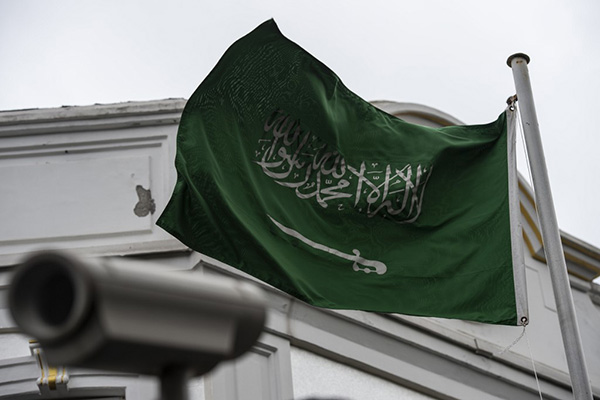
File photo. Yasin Akgul—AFP
An American exit from the region could force a rethink on the states Gulf rulers rely on for security and stability
The latest news disturbing the Gulf region is America’s stated intent to leave the region and stop being a guarantor of peace for the Arab states situated there. The U.S. came to the Gulf and took up its security to boost its own strategic economic assets. There are many reasons listed for America’s intent to finally leave the region but the most manifest is its self-sufficiency in oil, which it now holds in surplus.
The most prominent symbol of this security provision to the Gulf was the Fifth Fleet, which is “a numbered fleet of the United States Navy.” It has been responsible for provisioning fighting manpower in the Gulf, Red Sea, Arabian Sea, and parts of the Indian Ocean since 1995. There is additionally the U.S. Naval Forces Central Command (NAVCENT) in place in Bahrain.
If America decides to exit the region, Gulf rulers will feel denuded of all internal and external security. These “oil” states don’t keep large armies of their own because of the past Arab experience of military takeovers—linked to Arab nationalism requiring military conflict for its fulfilment—that on average lasted three decades before collapsing through military defeat. Apart from the American security umbrella, Saudi Arabia and the United Arab Emirates counted on security provided for “holy places” by Pakistan, which other Arab states could not because of their tendency to bring “radical ideas” with them.
India and Pakistan have been helpful in filling the “manpower gap” in the rich states of the Gulf. Over 87 percent of Pakistanis seeking jobs abroad go to the U.A.E. and Saudi Arabia, now numbering 4 million. They send back $5.4 billion from Saudi Arabia and $4.7 billion from the U.A.E. On the other hand, around 8.5 million Indians are working in the Gulf sending home $68.968 billion.
The exit of America exposes Saudi Arabia and the U.A.E. to: 1) Pan-Arab Islamist anti-monarchy movement concentrated in the powerful Muslim Brotherhood in Egypt; 2) hostility among the Gulf states, as for instance in Qatar which is supportive of Muslim Brotherhood; 3) the military presence of the much larger Iran in the Gulf and Shia influence in Yemen, Lebanon, Iraq and Syria; and 4) hostile presence of Turkey in Qatar, which keeps a Turkish military presence of 5,000 troops on its soil “just in case.”
The Saudi-U.A.E. relationship with India is close because of the import of Indian manpower and also because of Arab investments in the Indian economy. With Pakistan, too, the Arabs related with confidence and reassurance because of the Pakistan Army and its ability to supply security at short notice. This relationship was disturbed by the India-Pakistan equation in 2019 when India decided to “annex” the disputed territory of Jammu and Kashmir and split it into two federal territories in an attempt to integrate it fully. Pakistan wanted Saudi Arabia and the U.A.E. to stand by it in the subsequent standoff, which they did not. Pakistan responded by making a “hostile” deal with Turkey against its Arab Gulf patrons, assisting an unsuccessful Turkish attempt at taking the leadership of the Organization of Islamic Cooperation (OIC) away from Saudi Arabia and U.A.E.
Given this situation of threat, especially from inside the Gulf through Turkey and Iran, Saudi Arabia and the U.A.E. decided to move closer to Israel as a provider of security. Pakistan could not be much help despite its “protective” military presence in Saudi Arabia, because it could not spoil its relations with Iran. India, on the other hand, was less threatening because of its religious neutrality in the sectarian war threatening the Gulf. India, already present in Israel while Pakistan dithered, was a better “friend” than Islamabad where exigencies of diplomacy were defeated by the “rage” of the masses against recognition of Israel. At least 167 of the 193 U.N. member states officially recognize Israel, now with new “entrants” U.A.E., Bahrain, Sudan, Morocco, and Bhutan. Saudi Arabia is holding back because of its pan-Islamic status but is informally constitutes a part of the region Israel will provide security to.
Pakistan, economically unstable, has always been helped financially by its Arab friends in the Gulf but the latest “drawing of the line” between Saudi Arabia and Turkey—and Pakistan leaning to Turkey—has threatened this relationship. In dire straits, and in the IMF oxygen tent as always, Pakistan had borrowed $3 billion as “emergency aid” from Saudi Arabia before it decided to “go with Turkey.” Riyadh, therefore, decided to recall the $3 billion—which was very unusual and indicated the depth of the offense it had taken—but Pakistan was saved embarrassment when China came in with the money.
Unlike China, which has a big economic clout in the region and buys its oil from the Gulf, Pakistan is hampered by its unstable sectarian ideology. India, too, has overcome its past engagement inside the Cold War divisions of the world and can afford to be pragmatic. Pakistan must also see the new regional situation objectively and embrace pragmatism.
